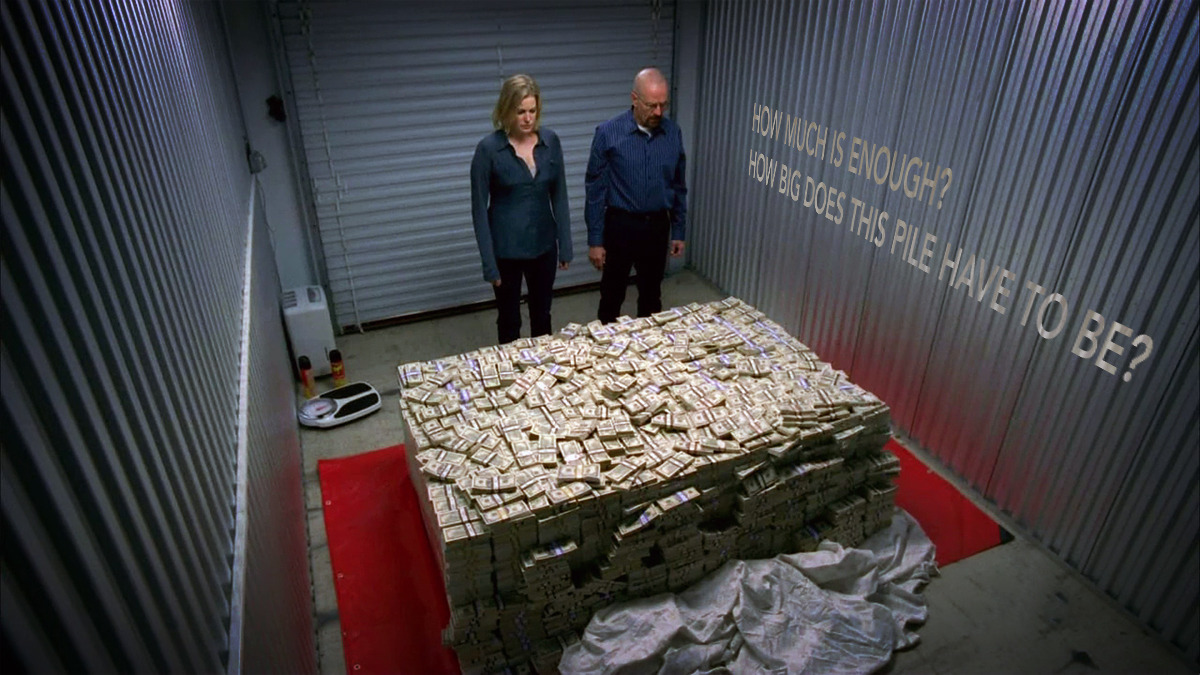How Much Is Enough ?
Posted by Big Gav
One of the things I've been doing over the past 6 months (while I've left this blog to fend for itself) is watching a couple of TV series (I hardly ever watch TV but I've found lately that good quality TV seems to have eclipsed movies in some ways and being able to download them makes watching them much more convenient) - namely Game of Thrones (like everyone else) and Breaking Bad.
It was good to see the concept of "how much is enough ?" getting some time in series 5 of Breaking Bad - I'm going to miss Walt when the series concludes later this year.
George Monbiot (flaky as he is) also has some ruminations on whether there ever is "enough" when it comes to money - Enough Already.
“I never did anything for money. I never set money as a goal. It was a result.”(1) So says Bob Diamond, formerly the chief executive of Barclays. In doing so he lays waste to the justification his bank and others (and their innumerable apologists in government and the media) have advanced for surreal levels of remuneration: to incentivise hard work and talent. Prestige, power, a sense of purpose: these are incentives enough.Others of his class – Bernie Ecclestone and Jeroen van der Veer (the former chief executive of Shell) for example – say the same(2,3). The capture of so much wealth by the executive class performs no useful function. What the very rich appear to value is relative income. If executives were all paid 5% of current levels, competition between them (a questionable virtue anyway) would be no less fierce. As the immensely rich HL Hunt commented several decades ago, “money is just a way of keeping score.”
The desire for advancement along this scale appears to be insatiable. In March Forbes magazine published an article about Prince Alwaleed, who, like other Saudi princes, doubtless owes his fortune to nothing but hard work and enterprise. According to one of the prince’s former employees, the Forbes global rich list “is how he wants the world to judge his success or his stature.”(4) The result is “a quarter-century of intermittent lobbying, cajoling and threatening when it comes to his net worth listing.” In 2006, the researcher responsible for calculating his wealth writes, “when Forbes estimated that the prince was actually worth $7 billion less than he said he was, he called me at home the day after the list was released, sounding nearly in tears. ‘What do you want?’ he pleaded, offering up his private banker in Switzerland. ‘Tell me what you need.’”
Never mind that he has his own 747, in which he sits on a throne during flights. Never mind that his “main palace” has 420 rooms. Never mind that he possesses his own private amusement park and zoo and, he claims, $700 million worth of jewels. Never mind that he’s the richest man in the Arab world, valued by Forbes at $20bn, and has watched his wealth increase by $2bn in the past year(5). None of this is enough. There is no place of arrival, no happy landing, even in a private jumbo jet. The politics of envy are never keener than among the very rich.
This pursuit can suck the life out of its adherents. In Lauren Greenfield’s magnificent documentary The Queen of Versailles, David Siegel, “America’s timeshare king”, appears to abandon all interest in life as he faces the loss of his crown(6). He is still worth hundreds of millions. He still has an adoring wife and children, he is still building the biggest private home in America. But as the sale of the skyscraper that bears his name and symbolises his pre-eminence begins to look inevitable, he sinks into an impenetrable depression. Dead-eyed, he sits alone in his private cinema, obsessively rummaging through the same pieces of paper, as if somewhere among them he can find the key to his restoration, refusing to engage with his family, apparently prepared to ruin himself rather than lose the stupid tower.
To grant the rich these pleasures, the social contract is reconfigured. The welfare state is dismantled. Essential public services are cut, so that the rich may pay less tax. The public realm is privatised, the regulations restraining the ultra-wealthy and the companies they control are abandoned, Edwardian levels of inequality are almost festishised. Politicians justify these changes, when not reciting bogus arguments about the deficit(7,8), with the incentives for enterprise they create. Behind that lies the promise or the hint that we will all be happier and more satisfied as a result. But this mindless, meaningless accumulation cannot satisfy even its beneficiaries, except perhaps, and temporarily, the man wobbling on the very top of the pile.
The same applies to collective growth. Governments today have no vision but endless economic growth. They are judged not by the number of people in employment, let alone by the number of people in satisfying, pleasurable jobs, not by the happiness of the population or the protection of the natural world. Job-free, world-eating growth is fine, as long as it’s growth. There are no ends any more, just means.
In their interesting but curiously incomplete book, How Much is Enough?, Robert and Edward Skidelsky note that “Capitalism rests precisely on this endless expansion of wants. That is why, for all its success, it remains so unloved. It has given us wealth beyond measure, but has taken away the chief benefit of wealth: the consciousness of having enough. … The vanishing of all intrinsic ends leaves us with only two options: to be ahead or to be behind. Positional struggle is our fate.”






